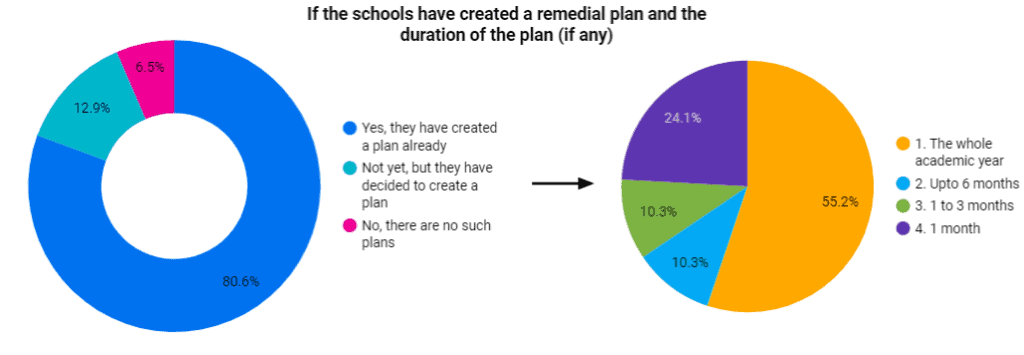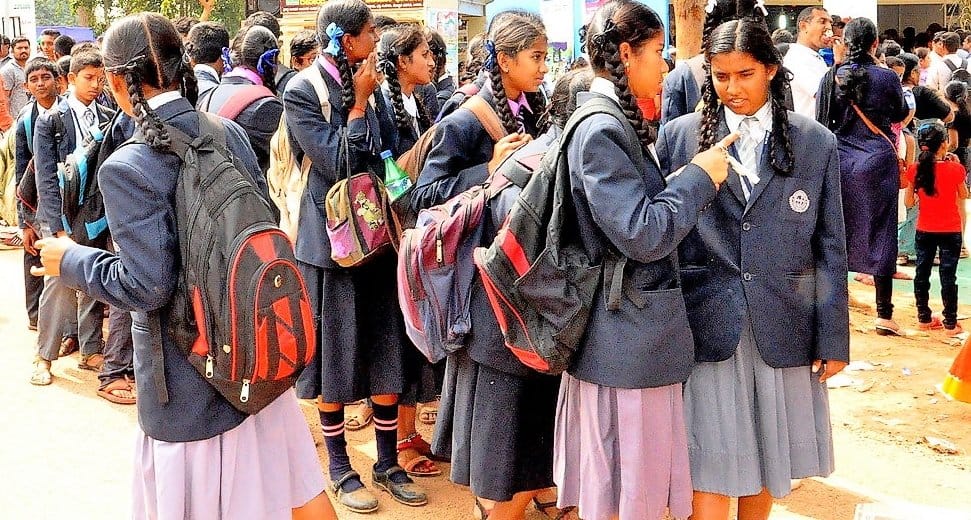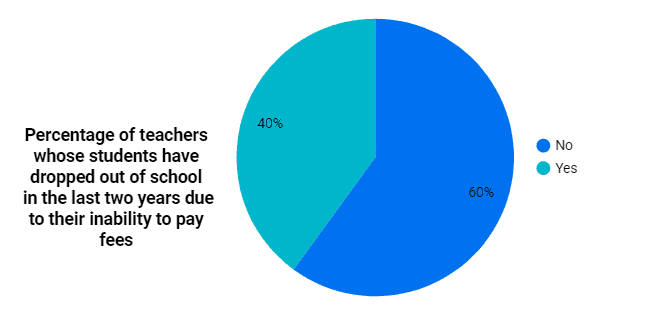As Bengaluru’s schools reopen fully for the new academic year, students are struggling to cope. The school shutdowns over the last two years have led to learning gaps, emotional problems and dropouts.
Sushma Chandrappa, a domestic worker, says her daughter attended her private pre-school for only four months in the last two years. “Her LKG classes had started four months before the 2020 lockdown, and she attended only those,” adds Sushma. Further, the pandemic reduced Sushma’s wages and her husband, an auto driver, lost his income completely. They were unable to pay school fees or ensure smartphone access to their daughter. Last year, worried offline classes may not resume, Sushma didn’t admit the child to UKG.
Her daughter should be in first grade this year, but schools were unwilling to admit her.”Some bigger schools were willing to admit her only in LKG,” says Sushma. “I was told to first send her for tuitions and only then get her admitted to UKG”. Eventually, a small pre-school accepted the child into UKG directly.
Sushma has, however, arranged for daily tuition classes. “She is in an English medium school, she should be able to understand what teachers say,” reasons the mother. The school fees is Rs 1,200 and the tuitions cost another Rs 500 per month. Sushma continues to face financial difficulties, but says that her daughter’s education is important.
A large number of Bengalureans like Sushma – domestic workers, migrants, daily wage labourers – were unable to ensure continued education for their children during the pandemic. However, major learning gaps are present even among children who regularly attended online classes.
“She started learning Kannada for the first time in the first grade online, and by second grade she had to learn poems, stories and to write full sentences,” says IT employee Remya P K about her 8-year-old daughter. “Also, many concepts in maths, like calculations and measurements, were taught in these two years. She couldn’t understand the classes and lost interest.”
The child, previously a class topper, avoided Kannada and maths lessons until she was admitted to tuition classes a few months ago.
Read more: Online education no cakewalk for private schools either
Another parent Nidhi says that her 5-year-old son developed emotional problems when his private pre-school pressured him to learn. He had attended nursery and LKG classes entirely online, but was expected to have learnt to write when the school reopened this February. “His teacher told me other children were coping, so I also pressured him, making him write for hours together,” says Nidhi. “He then became so scared of writing that he would wake up in the middle of the night and ask whether he has to write”.
Organisations like the IMF and World Bank have pointed out that, in the long term, learning losses could affect students’ future prospects in securing high value-added jobs and lifetime earnings. Clearly, schools need to have a remedial plan to bridge these learning losses.
Remya and Nidhi say their children’s schools have not communicated to them any specific remedial plan for the new academic year, though the schools did hold extra classes during the summer vacation.
Sushma says her daughter’s school, which reopened in May, holds an extra hour of classes daily for children who are lagging, and has also asked parents to contact them in case their kids have learning difficulties.
Most private schools have some sort of remedial plan
Do private schools in Bengaluru have some plan for bridge courses for students? Citizen Matters and MyCENTA, a community of teachers with over 6.5 lakh members nationally, conducted a survey to find out.
Across the country, 355 private school teachers responded to the survey, including 31 from Bengaluru. More teachers in Bengaluru (93.5%) said their school had already created or had decided to create a remedial plan, compared to 84.6% teachers nationally.
The majority of teachers in Bengaluru (70%) believed that their students’ performance is less satisfactory than usual, and another 7% believed it was poorer than usual. Not surprisingly, almost all teachers in Bengaluru felt that remedial plans were important (96.6%, compared to 86% teachers nationally). This indicates that many private schools in Bengaluru do acknowledge the learning gap among students and have thought through ways to fix it.
However, the nature and duration of remedial classes vary widely across Bengaluru schools, irrespective of the fees they charge. Of the 29 teachers whose school had a plan, around a quarter said it would last only a month. Another 10% said the plan in their school was for 1-3 months. However, over half the teachers said their school’s plan was for the whole academic year.

Malathi Nayak, a maths teacher at an Electronics City school, says they have a two-week remedial programme initially, and then year-long assessments. “During the current remedial classes, we are teaching the basics,” says Malathi. “I split children into small groups, and the leaders in each group will teach the others. Else we can’t give individual attention to all 40 kids in a 40-minute session. Once regular classes start on June 6th, we are supposed to hold tests for students on finishing each chapter. Those lagging will be identified, and separate classes held for them.”
Malathi finds learning gaps to be higher, and more difficult to identify, among older kids. About half the children in her school are from economically poor backgrounds, and many hadn’t attended classes due to the lack of gadgets. “Children who were already below-average in studies may take more than a year to catch up,” she says.
Manjunath, a Kannada teacher for grades 8-10 at a Yelahanka budget school, says his school neither has a remedial plan nor has held discussions with parents. “I take extra classes for 10th standard students, but not for other grades,” says Manjunath. “About 30% of them are extremely dull now, and without extra preparation they will fail in Board exams. I have to teach them the basics since they never attended 8th and 9th grades.”
Nataraj, Kannada teacher at a budget school in Byadarahalli, says only around half his students had attended online classes in the last two years, and many haven’t returned to school yet. Many of the parents are daily wagers and migrant labourers. The school has consulted parents and started remedial classes. “We hold extra classes every day from 4 pm to 6 pm,” says Nataraj. “Classes will be held at least for six months, and could be extended to the whole year if needed”.

Educationist Pranil Naik says that children’s learning loss may not be limited to just two years of the shutdown. “It could go way back, up to the last 3-4 years, depending on how much learning the child has retained,” says Naik. “Any solution for learning loss should keep the child at the centre.”
Irrespective of the type of solution adopted, Naik mentions three key components. “First, get the feedback of parents and teachers. Second, teachers will have to go beyond the call of duty. Third, there should be some form of blended learning for less privileged students – for example, outside of school, there could be a support system by volunteers.”
Psycho-social support may be low in low-budget schools
Results from the Citizen Matters-MyCENTA survey show that lower-budget schools are less likely to provide dedicated psycho-social support for students. Among schools charging monthly fees of Rs 5000 and over, 90% had such a support system. Whereas in schools charging monthly fees below Rs 5,000, only 63% provided such support.
Pranil Naik says that emotional support is critical. “There may have been job loss, COVID deaths or domestic violence in a child’s home,” he points out. “So before looking at solutions for learning loss, we should spend some time empathising with the child, at least for the first quarter of the year.”
Across all types of schools, a sizeable number of teachers (40%) said students had dropped out due to their inability to pay fees. Though dropouts have occurred in higher-end schools too, the rates were more (45%) in schools with monthly fee below Rs 5,000.

Year-long programme in govt schools
For public schools across the state, the government has introduced a year-long learning recovery programme ‘Kalika Chetharike’. As Citizen Matters had reported earlier, a large proportion of government school children had attended no online classes in the last two years.
Read more: The reality of online learning in Bengaluru’s govt schools
As part of the programme, a state-level team of teachers and educationists have redesigned the curriculum for all classes, and created Teaching-Learning Materials to address children at different learning levels. They have also created a handbook to guide teachers. To implement the programme, 2000 master resource persons will train 2.5 lakh teachers.
Though the programme has been lauded, some have voiced concerns.
“The programme only talks about outcomes and competencies,” argues educationist Niranjaradhya V P. “How teachers will achieve this is not clear, and parents are not involved. Also, there is no external/community support system, though the learning gap is huge and can’t be fixed within school hours alone. The approach should instead be decentralised – give broad guidelines and parameters to teachers, let them evolve their own methodologies depending on the learning level and needs of their students, and empower them with resources.”
As far as Social Sciences – history and citizenship studies is concerned, if notion of learning, understanding and knowledge is limited to children’s capacity to retain sundry information, then over two years the loss assessed would certainly emerge as staggering. Unfortunately when one looks at Karnataka state social science textbooks, much of history is indeed reduced to such (paradoxically enough) archaic notions of societal knowledge. Learning and coping with long gaps in such learning can be more effectively and meaningfully addressed , without overstressing teachers, only if the social science discipline is more thematic and conceptual. Supposing a class VI student as per the syllabus were to understand the idea of monarchy or taxation. So what if despite such a long gap in schooling, the student can be engaged with the same theme but with different examples more appropriate to class VIII than class VI? Similarly if we are to look into architecture more conceptually then too it will be more of missing examples and case studies lost in class VI & VII but which can be taken up in class VIII too starting from basics premise & ideas in architecture – on which even if we were to dwell longer time or periods, it won’t imply eating into time meant for class VIII ‘portions’. So if were to have a curriculum in which history is thematic where concepts like state, governance, monarchy, social structure, trade, occupations, agriculture, art, rituals etc were the basis for historical understanding, to be learnt over 5 years (from class VI to X) evolvingly and in greater complexity but not necessarily in unilinear fashion, then the anxiety of learning loss, getting worked up over unfamiliarity of children with more discrete facts will I assume be far less. The important thing here is a curriculum which values substance over volume or quantity. The learning gaps seen today actually exposes the flawed curricular ideas particularly understanding of epistemology of history exacerbated by the pandemic. Mere cognition of different dynasts, battles, dates in itself is meaningless and even if kids don’t know the names and dates of battles or dynasts or name of specific monuments or works of literature, is barely a learning loss. It’s more important to know, say, the nature of society and state to explain why belligerence was so common in the past. This can be expressed and articulated in ways appropriate to child’s cognitive stage levels and linguistic competence.